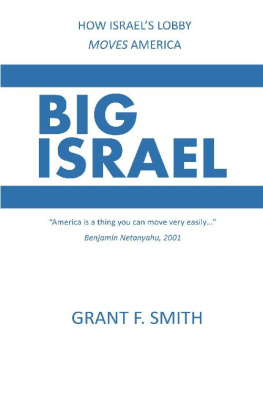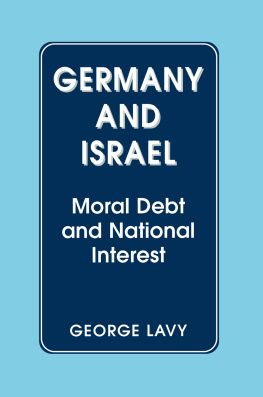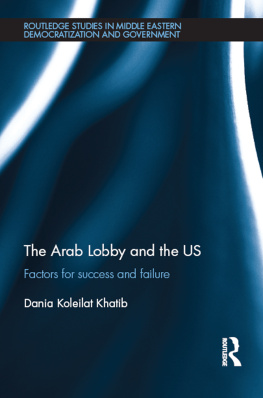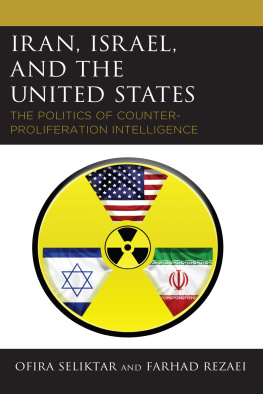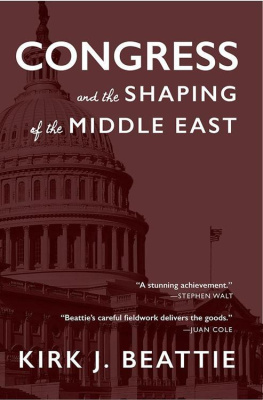I knowwhat America is. America is a thing you can move very easily, move it in theright direction.
BenjaminNetanyahu, speaking to Jewish West Bank settlers in 2001.
The author wishes to acknowledge and thank themany cited sources quoted throughout this work. Thanks also to JeffreyBlankfort for developmental editing, Janet McMahon for copy editing, and HenryNorr for proofreading and timely suggestions.
1 THE ISRAEL LOBBY
Asking whether the Israel lobbyexercises undue influence has only recently stopped being entirely taboo. Ifdefined as influence by which a person is induced to act otherwise than bytheir own free will or without adequate attention to the consequences, thenthe power wielded by the lobby clearly is undue. In modern-day America thereis, however, nothing particularly unique about undue influence since a numberof well-funded and highly organized interest groups, representing only a tinyminority, also exercise undue influence, sometimes in concert with the Israellobby. These certainly include financial services, the energy industry, and weapons-makingelites. Howeverand unlike most lobbying for Israelthose groups openly exerciseundue influence, lobby overtly and are the subject of robust news reporting andpublic debate. Due to the long and well-remembered history of conflict as Jewishminorities within larger populations, those running the most influential IsraelAffinity Organizationsa term that will be defined in detailthat are predominantlyJewish often unfairly characterize attempts to analyze or quantify theirinfluence as driven by anti-Semitism. As a barrier to scrutiny, this charge haseffectively prevented a great deal of critical analysis. In particular, itprevents many individuals who are neither Jewish, nor minor insider critics oftactical Israel lobbying issues, nor working to advance more acceptable IAOinitiatives, from speaking up.
This book proceeds, unapologetically, into thisminefield on the principle that IAOs are more than fair game and overdue forexhaustive review, particularly to reveal those broader interests negativelyaffected by their actions. Declaring oneself pro-Israel has become as much alitmus test for running for public office as it is a screen to evaluate appointeeswishing to work in sensitive positions in agencies such as the U.S. StateDepartment, Department of Justice or Treasury. The attributes of IAOssomereplicable, others utterly uniquetheir history, trajectory, battles lost andwon, and seeming permanence on the scene, also make them one of the mostfascinating players in so-called special interest politics in America. Afascinating and timely example is Bnai Brith.
Established in 1843, Bnai Brith formed afraternal lodge system that offered social welfare services and a bridge towardintegration to the waves of Jewish immigrants entering the United States. Yetwithin a decade, Bnai Brith attempted to use the power of its membership baseto change U.S. foreign policy. Its first well-known foray occurred in 1851 whena number of Swiss states refused to permit Jewish residence. Bnai Brithlobbied against the U.S. secretary of state signing a trade agreement withSwitzerland unless the policy was reversed. This effort was celebrated as thebeginning of a Bnai Brith commitment to fight for and protect Jews and Jewishinterests around the world.
In 1903, a Jewish community in the Bessarabianprovince of the Russian empire (current day Moldova) was attacked by groupsspurred on by accusations that Jews were murdering Christians for Passovermatzo. In two days of rioting nearly fifty Jews were killed, ten times as manywere injured, 700 homes were destroyed, and 600 stores were robbed while policeand military stood by without intervening. Response to the 1903 Kishinev pogromin Tsarist Russia was the second major foreign policy lobbying initiative by anorganization that today is only one among hundreds promoting the advancement ofIsrael by harnessing the influence of the United States government. Bnai Brithspresident, Simon Wolf, met with President Theodore Roosevelt and Secretary ofState John Haypersuading them to use the power of the stateto transmit apetition of signatures gathered by Bnai Brith lodges through the U.S. Chargede Affairs in Saint Petersburg to the Tsar. The Russian government rejected it
Jewish leaders inside and outside Bnai Brith thenagitated for more U.S. Russia policy linkage to what they termed Jewishinterests. They demanded an immediate reduction in American cooperation withthe Russian government on a range of vital issues because of Kishinev. Momentumalso continued to build for creating a lobby that could credibly be perceived tospeak with a unified voice representing all American Jews on domestic andinternational affairs. This effort by fairly elite and unrepresentativeorganizations to portray themselves as a unified front continues today, thoughit faces much greater scrutiny.
In 1910, Bnai Brith invited President Taft toaddress its general assembly. Bnai Brith leaders were, in turn, cordiallyreceived in the White House. In 1912, the U.S. abrogated its commercial treatywith Russia, an act for which Taft received Bnai Briths annual medal to the personwho had done the most for Jews. Bnai Briths success was an importantpolitical milestone in Washington. It had elevated the concerns of a newspecial interest over those of business, cultural and other interests in Russia.
However, the core challenge to those advancingthis new special interest was obvious. Initiatives had to be carefully framedas American interests so as not to draw too much criticism. These efforts wouldlater become preemptive. Criticism of those writing about organized agitationfor the U.S. to fight wars that benefitted the formation and interests ofIsrael became harsh and immediatemost often characterized as anti-Semitismor hatred of the Jews, or if one was Jewish, self-hatred. Careers were damagedor destroyed by such charges.
Today, the Israel lobby, defined here as thecollective of Israel Affinity Organizations, is more openly considered to be apowerful lobbying force, with some caveats. This has been disturbing to organizationssuch as the Anti-Defamation League, which branded itself as a Jewish defenseorganization. Few things have challenged Israel Affinity Organizations andtheir programs so much as this recent open acknowledgement that such a group oforganizations exists and forms an interlocking interest that wields vastandundueinfluence in the United States, primarily to promote Israeli interests. Beyondactual recognition of this fact, proceeding toward any informed criticism oftheir true and sometimes unflattering history, programs, operational codes,secrecy, interrelations and quantifiable negative impact on other Americans is mostlyignored, suppressed when that fails, or decried as anti-Semitism when it finallybreaks into any relevant or high profile public forum.
Yet the publics attention is not waning. The costsof IAO policies in terms of blood and treasure when successfully packaged andsold in the past as U.S. national interests that must be pursued above allothers have steadily mounted. Recently, many U.S. states individually passedtheir own Iran economic sanctions, sent their U.S. law enforcement officials toIsrael for training and inserted anti-Boycott Divestment and Sanctions measuresinto various laws in order to protect Israels occupation of Palestinianterritory in global trade legislation. This is mostly the work of IAO modellegislation drives in tight coordination with national organizations with tiesto the Israeli government rather than grassroots efforts on behalf of a statesvoters. That most Americans reject the many resolutions praising Israel intheir name is demonstrable in surveys.

